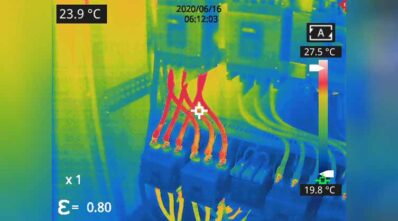Constant status monitoring of wind power equipment operations with InfiRay
By EPR Magazine Editorial June 6, 2022 12:25 pm IST
By EPR Magazine Editorial June 6, 2022 12:25 pm IST

This article talks about the main applications of the InfiRay Thermal Camera, in status monitoring of wind turbines.
The development of the wind power industry brings about an increase in the maintenance workload of wind power equipment and facilities; thus, the cost of manual maintenance also increases accordingly. Consequently, customers also require more efficient status monitoring solutions. An InfiRay thermal camera can provide a 24*7 superior operation status monitoring service of wind power equipment.
Pain points in operation status monitoring of wind power equipment
Wind turbines are usually exposed to extreme environmental conditions for a long time, such as typhoons, thunderstorms, sandstorms, frosts, rain, and snow. These conditions result in a high failure rate, poor reliability, and low equipment availability. Therefore, new energy enterprises often face high costs of equipment operation, maintenance, and overhaul.
Inefficient operation and maintenance
The traditional manual routine inspection cannot grasp the status of onsite equipment in real-time, leading to the fact that the decision-making lacks data support and the abnormal problems are difficult to trace and review.
High maintenance costs
Wind power plants are located in remote areas with critical geographical conditions. After the fault occurs, maintenance personnel are required to enter the onsite tower for manual troubleshooting, which causes high labour and time costs.
The previous overhaul system
Wind turbines are deployed in a distributed manner, and the working environment and operational status of each turbine vary greatly. The overhauled system focusing on the traditional “periodical inspection and repair” mode is no longer applicable to the current situation of the new energy industry.
Supplement for the difficult part
Due to lack of foreseeability, “fire-fighting” emergency maintenance is easy to occur after faults, generating a long shutdown time. Moreover, the industrial chain of spare parts in the new energy industry is incomplete, and many spare parts need to be imported from abroad, so the situation of “stopping for spare parts” often arises.
The main applications of the InfiRay Thermal Camera in the status monitoring of wind turbines are:
Online monitoring for wind turbine nacelles
The nacelle is the core part of a wind turbine that needs real-time detection the most. It is crucial to monitor the heating of the pitch and motor in the nacelle, and fix the pitch quality problem under the condition of low visibility. An InfiRay compact thermal camera can be installed and used in the wind turbine nacelle with limited space. With its high thermal sensitivity and temperature visualisation, ultrafine and hidden faults can be found, and temperature data and alarm signals can be sent to the working computer of the on-duty personnel through Ethernet to achieve unattended operation.

Online monitoring for wind turbine cables
When sleeving cables, a small amount of air may enter the sleeves. As cable service time increases, the sleeves oxidise, causing temperature to rise and power transmission efficiency to decrease.In some severe cases, cables will be fused together to cause fires.
The InfiRay thermal camera is capable of monitoring the temperature rise of cables and setting a high temperature alarm threshold, thereby realising remote intelligent monitoring. By checking for temperature changes, operators can determine whether to shut down for maintenance.Inspection for operation status of wind turbines’ main parts
The bearing, gear, and brake disc are the vital parts of a wind turbine for converting wind energy into mechanical energy. However, a contact inspection cannot be carried out during the operation of wind turbines. As a consequence, problems such as wear and damage are
not easily discovered in time. An InfiRay thermal camera can be used for non-contact temperature measurement. Making use of temperature changes, operators can perform shutdown maintenance accordingly.
Routine inspection for wind power step-up substation
For key parts such as transformers, casings, and wire clips, InfiRay instals light-load PTZ thermal cameras for continuous inspection and adds ROI areas to ensure reliability and real-time reports. At the same time, it enables accurate temperature measurement in harsh outdoor conditions.
The benefits of InfiRay thermal cameras
Visible temperature distribution and fault points
Thermal cameras automatically capture the hottest spot on the screen or in an area to accurately visualise and locate problems. This helps engineers ascertain the root causes of faults in a reliable and precise manner to formulate a solution quickly.
Remote and non-contact detection without changing the target’s structure
On one hand, the non-contact temperature measurement does not affect the surface temperature of the object to be measured, giving a more accurate temperature measurement result; on the other hand, it is more convenient and flexible. For scenarios where it is not convenient for thermal camera installation, hand-held temperature measurement thermal cameras can easily acclimatise.

Alarm function and abnormality alarm messages
Thermal cameras can be configured to operate in highand low-temperature ranges.When the temperature reaches the set range, they raise an alarm to warn responsible staff to carry out further inspection or maintenance.
Saving temperature data and generating temperature change curves.
The temperature data from a thermal camera is sent to the control computer at a certain interval through Ethernet to generate a temperature change curve. Users can determine the part replacement period and operation and maintenance period according to the temperature change trend.
Secondary development support for customers’ unique advantages
SDKs are provided to support users’ secondary development and empower customers to form unique advantages. Alarm messages can be pushed through the IO port, serial port, or other various methods to assist customers in the action linkage and in the development of automation devices.
We use cookies to personalize your experience. By continuing to visit this website you agree to our Terms & Conditions, Privacy Policy and Cookie Policy.